Abstract NounAbstract nouns reflect intangible idea?things that cannot be sensed or detected by the five human sensory organs. Love, happiness, compassion, and science are all abstract terms since they cannot be touched or seen. 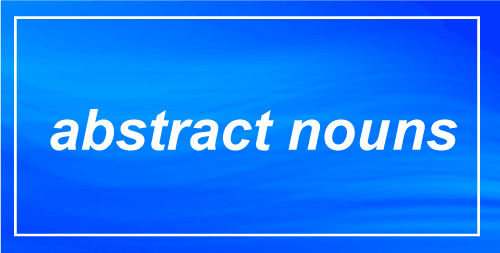
Abstract nouns can be difficult to define with grammatical rules because they lack a concrete frame of reference. Read on to clarify the fundamentals in this fast guide so you can utilize abstract nouns with ease! What exactly are abstract nouns?Most often, nouns express items (like individuals, location, items, and idea). But certain things are not truly things! Since idea, emotion, personality quality, and philosophical notion do not occur in the real world/ realm and even does not have the ability to be sensed by human senses or perceived, we refer to them as abstract nouns to distinguish them from concrete nouns. An individual, location, object, notion, or idea is a noun. Nouns come in a variety of forms, notably concrete and abstract nouns. Concrete nouns are individual, location, or items that can be felt or seen using one of the five human senses. Abstract noun are notions or ideas that cannot be viewed, listened, touched, tasted, or smelled. Abstract noun, on the contrary, are intangible notions or idea. Because the word abstract alludes to anything that exists aside from concrete existence, it can be used to define nouns that cannot be directly perceived in a sensory form. For instance, although being a term, freedom cannot be immediately felt by any of the five human senses. 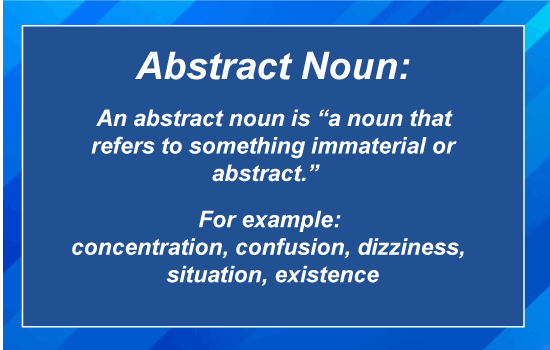
Recognizing Abstract NounsLet us have a look at how can we recognize abstract nouns Since there are so many terms that can serve as distinct parts of speech, it can be hard to detect whether a noun is abstract. Some terms, for instance, may operate as verbs in some circumstances and abstract nouns in others. Love and taste are two such examples. love as a verb - I love my family. (Because the term love conveys action in this phrase, it functions as a verb.) Love as a noun - Give my wishes and love to him. (The word love serves as a noun in this phrase.) It is an abstract term since love cannot be quickly detected or sensed by the five senses.) taste as a verb - Susan could taste the basil in the dish. (The auxiliary word "could" works with "taste" to describe an activity in this line.) As a noun, Jessica has excellent fashion taste. (Taste serves as an abstract noun in this statement.) Jessica's choices are referred to as her taste.) Remember that a verb is a term that fits an action. A noun is a term that symbolizes an individual, location, object, idea, or concept. An abstract noun is one that doesn't have the ability to be detected or recognised by the senses. Concrete Noun in comparison to Abstract NounsConcrete nouns are the total opposite of abstract noun. Concrete noun, unlike abstract noun, can be physically experienced. They are tangible and are present in the physical or real realm. Furniture, pets, objects, and consumables are instances of concrete noun. In the actual, physical realm, we can touch and see a chair, but we can't do the same with an abstract noun like 'freedom.' Instances of Common Abstract Nouns in PhrasesAbstract nouns are either countable or uncountable (mass). They might be singular or possessive as well. Abstract nouns are subject to almost the same rules of grammar as in other nouns. Consider a few popular instances, organized by topic and accompanied by sample sentences. See instances of abstract nouns for even more terms that are abstract nouns. Feeling and EmotionAbstract nouns are terms used to represent a person's emotional experience or how they are feeling. Agony - I've been in a continuous state of agony since I injured my back. Disgust - Helen couldn't disguise her disgust. Joy - I can't put into words how joyful I was when I was awarded the promotion. Exuberance - Kate's exuberance is overwhelming. Hopelessness - I'm working hard not to surrender to hopelessness. Indifference - Her indifference is startling. Traits and StateSome abstract nouns indicate a person's mental state or a trait that a person possesses. Determination - I'm going into the business meeting with a strong sense of determination. Dotage - Since she's in her dotage, my grandma isn't afraid to express herself. Confusion - Ever since the office supervisor's resignation, everything at work has been in a state of confusion optimism - Her optimistic attitude is contagious. Pessimism - His pessimistic attitude is depressing. Tumultuous - She is a tumultuous young lady. Concepts, Ideas, and IdealsAbstract nouns can also cover many concepts, ideas, and even ideals. Camaraderie - There is a lot of camaraderie amongst team members. Hospitality - I am glad for the hospitality you have offered to my family. Sensitivity - This topic must be treated with extreme sensitivity. Leisure - Everybody deserves some downtime. Education - A great education cannot be substituted. Tact - When discussing sensitive issues, tact is essential. Events and MovementsAbstract nouns are frequently employed to refer to certain occurrences or kinds of movements. Activism - It is a mode of life for some people. Commencement - How do you plan to come to our commencement? Future - How are your plans for the future? Moment - Competing for the Games is a once-in-a-lifetime moment for a competitor. Performance - Kate put on quite a performance there. Progress - Substantial progress has been covered in the recent month. Communicating using Abstract vs. Concrete NounsAbstract nouns are used to describe things that cannot be seen, heard, tasted, smelt, or experienced. They are frequently employed to express meaning in a variety of contexts, ranging from regular conversation to artistic, educational, or technical writing. It's crucial to remember that abstract nouns might have diverse meanings for various individuals. The great taste may imply a unique and diversified style to one individual. To another, the fine taste may imply a clean and modern appearance. That is why context hints are so crucial. 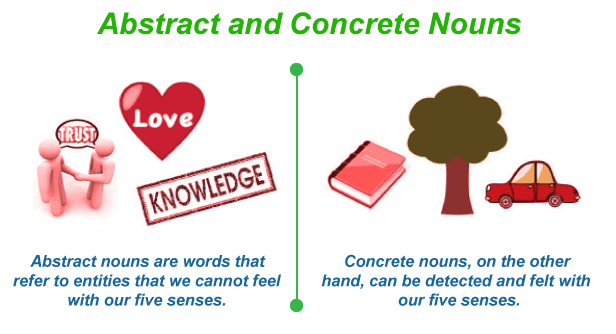
Using Suffixes to Create Abstract NounsAbstract types of nouns are extremely widespread and play a significant role in communication. These nouns are developed from a root word by attaching a suffix or applying another change in many instances. The term "kid," for instance, is a concrete noun. However, because "childhood" is an intangible state, it is an abstract term. As evidenced by a few instances for each suffix, the suffixes mentioned below are frequently employed to produce abstract nouns. -acy - democracy; diplomacy -ance - resistance; acceptance -ism - patriotism; socialism -ity - responsibility; diversity -ment - movement; acknowledgement -ness - weakness; sickness -ence - irreverence; violence -ship - kinship; studentship -tion - affiliation; dedication - ty - security; integrity 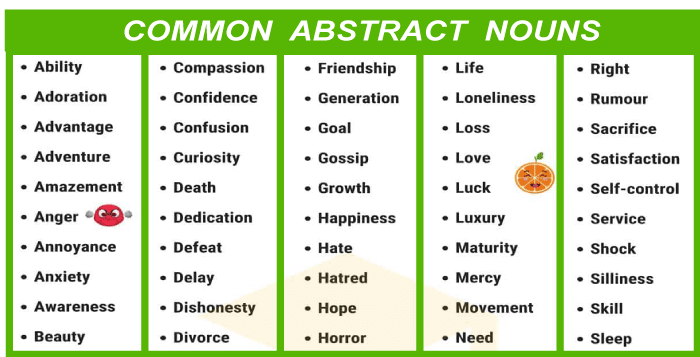
When do we utilize Abstract Nouns?Abstract words are vague by definition. They're a word for ideas and concepts that we can't see in the actual world, which means that everyone has a different understanding of what they imply. In everyday life, we frequently employ abstract words describing our emotions. Abstract nouns include words like 'love,' 'hate,' 'anger, "sadness,' and 'peace.' Everybody understands what they imply, so we may use them to describe our emotions to one another. Nevertheless, employing abstract nouns in writing might lead to ambiguity. For instance, when you consider the term "happiness," what can make you joyful or happy is not the same as that makes some other person happy. That implies you'll both have a distinct definition of 'happy' in your heads. This can make it challenging to express ourselves precisely. As a result, merely utilizing abstract nouns will not provide the reader with a clear understanding of what you intend. (Until, of course, you want the audience to think and form an opinion.) 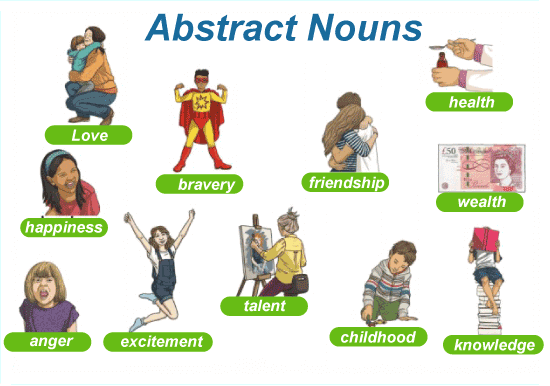
To write clearly and effectively, we should employ concrete nouns in addition to abstract ones. These will provide particular, concrete instances that will assist the reader in understanding our perspective of the abstract term. For instance, if you're writing about a vacation of 'relaxation' (abstract noun), you might mention getting a lie-in (concrete noun) or visiting a spa (concrete noun). Because everyone has a distinct definition of 'relaxation,' it's a smart option is to use concrete nouns to define what you intend. What Is the Difference Between Countable and Uncountable Abstract Noun?Abstract nouns can indeed be countable or uncountable, which affects if an article (a, an, the) or a quantifier (few, many) is required well before the abstract noun. Most abstract nouns could be countable or uncountable, based on their contexts. If the abstract noun has a broader, universal meaning, it is uncountable and hence does not require an article or a quantifier. Honesty is always the best rule. In this line, we're talking about 'honesty' as a concept and in general. It is not a situation of individual honesty; hence there is no need for an article or a quantifier. If an abstract noun alludes to anything particular, it becomes a countable noun and requires an article or a quantifier. They have an innate skill for singing. In this instance, the 'skill' relates to a specific talent - the subject's singing. This implies that the article 'a' is required. ConclusionThe problem with abstract nouns is that they are often ambiguous. Since we can't see them, everyone has a distinctive perception of how and what they are. Just like "beauty is in the vision of the viewer," each "viewer" interprets the term beauty uniquely. Consequently, a good writing most often encompasses concrete instances mixed in with abstract terms to conform to the debate in actuality. Concrete examples help to demonstrate our views and persuade readers to see events in our perspective instead of their own. For instance, if you were writing essays about the necessity of selecting a career (abstract word), you would do well to include particular occupations such as a doctor, mechanic, or proofread (concrete nouns). Abstract nouns and their laws can be difficult to grasp. With our help, you should have a clear grasp be well on your approach to writing about them with confidence.
Next TopicCollective Noun
|
 For Videos Join Our Youtube Channel: Join Now
For Videos Join Our Youtube Channel: Join Now
Feedback
- Send your Feedback to [email protected]
Help Others, Please Share









